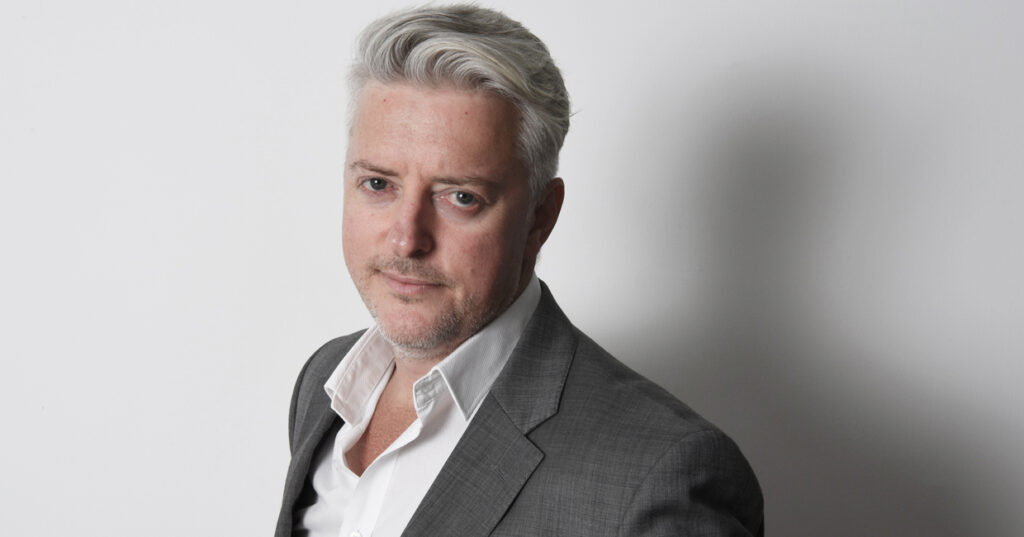Wells International is a new hospitality design company founded by architect/designer Justin Wells. The fast-growing practice is based in the United Arab Emirates and Saudi Arabia, with a team of over 30 architects, designers, high-level industry consultants and hospitality specialists located around the world, from London and Lyon to Bangkok and Dubai. The company is entirely focused on hospitality projects, with four areas of expertise – hotel design, F&B design, spa and wellness, and boutique collections.
Please could you begin by telling us a little about yourself?
I was 12 when I first discovered the allure of hospitality. The then Regent of Fiji imposed a lifelong impression on me of how magically a resort transforms from day to night – dramatic and mysterious lighting and shadows were quite transformational for me. I was hooked –
Today, my story continues on a perpetual journey. Having left my native Australia nearly seven years ago, bound for Dubai, the world’s newest global city, I was excited to expand the hospitality portfolio I already possessed, in a city renowned as the fastest man-made event in Earth’s history. Having designed hospitality projects across Australasia, South East Asia, the Middle East and Europe, these regions continue to be my focus for hospitality design. I enjoyed my former executive roles, having worked with HBA, Woods Bagot and dwp – however, like in showbusiness, timing is everything.
The time was certainly right to launch Wells International – Global Hospitality Design Consultants.
Recently, I was told I was brave to create a new company at this time – my response was simple. In this market, we can be more competitive with the hospitality giants than ever before. Clients are embracing remote-connectedness and unburdening themselves of the enormous overheads that comes with the larger design houses – it’s an enviable position in a time of uncertainty. I told the gentleman, “it’s not brave, rather, it’s smart.”
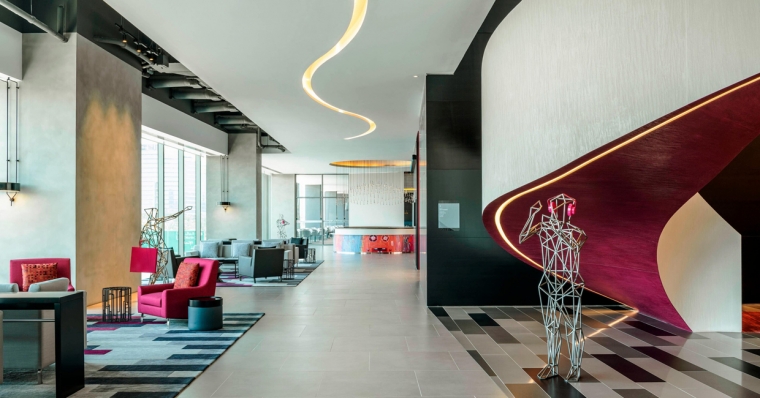
Describe your style-
It would be wrong to suggest we have an aesthetic language, but we do care deeply about how we work, the process of investigation, the manner in which we understand social and historical fabrics of place and context, cultural cultivating, and the method of gazing forward to how a space will be ‘Instagrammed’. We look for the big idea early, and how the world will remember the building – then we research.
Our process of design mirrors the components of theatre – namely, a script, scene, actors and audience. We use these elements in our process of design ideation.
We seek to move people when they go to our projects. In theatre, you are taken away in the moment, and your focus can be emotive, aspirational, decadent or exquisite, but ultimately it resonates – this is our style.
With so many hospitality designers in the industry, how does Wells International stand out?
Wells International represents future design thinking for the hospitality industry. We are a company founded on the positive potentials that have been created from the pandemic. Borderless design, agility and scalability, office-optional, lean processes and specialising, above anything else – be talented.
We tell our clients that we approach their projects as you would select a suit. We don’t do ‘off the rack’. Our team is fitted to the projects’ needs. We select the designers that will provide the best result for the project, client and operator.
It’s a difficult time for the hospitality industry. What do you think will be the sector’s biggest challenge, post-Covid?
Mobility is clearly an inhibitor of travel choice and freedom. People create some of their greatest memories when travelling, and if open sky travel remains limited or even truncated for choice, this will significantly slow down the recovery of the hospitality industry. Consider places that are founded on destination travel – ‘journey’s ends’, where people are ‘experience collectors’. If we cannot get to the places we seek, it will take some time for the whole industry to recover. Simply, we need to open up the skies to flying, with the same freedoms that existed prior to the pandemic.
How can design be used to manage the guest’s expectations of the hotel experience?
We design for people ultimately, and how people experience hotels will always vary from guest to guest – but we do consider how best to elevate design to enhance each guest’s experience. I think it’s worth highlighting that in luxury, the guest requirements differ to premium brands and select service. We also see the different guest needs within the luxury segment adding further complexity – barefoot luxury, approachable luxury, classic luxury and distinctive luxury, in different ways, demand different expectations of the guest. Ultimately, we are moving towards ‘hyper-personalisation’.
Turning to the topic of authenticity of experience, how do you approach each project?
For every project there is a new story to tell. We always start at the beginning of a process and consider the ‘big idea’ – we research context, social fabric and historical references, and then once all of this information is collected, we start to develop spaces that are informed by this research. Authenticity is really a summation of suggesting that the touchpoints a guest experiences are ‘real’, grounded in the right light or reason, and provide something that is meaningful for its purpose, and not superficial in its ambitions. I would think most designers seek to deliver design that portrays authenticity. We certainly are of the belief that people should be able to take something meaningful away from our designs.
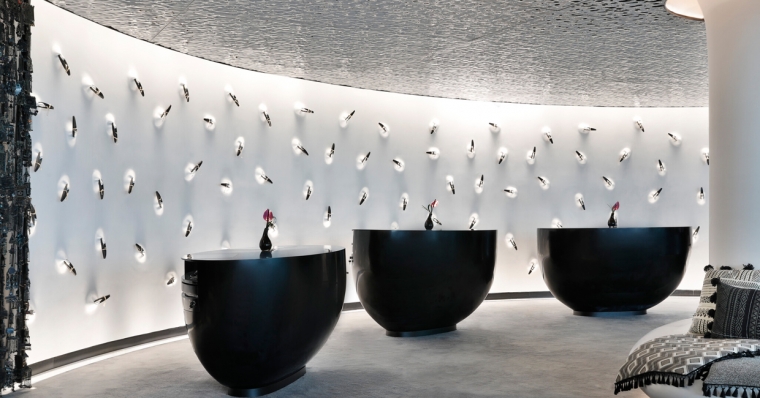
Do designers think about loyalty when they design a hotel, or is it just an operator’s concern?
Brands create loyalty through legacy, quality, segmentation, ethos and philosophy, or scarcity – and all are bigger than the designer’s direct impact upon loyalty creation. However, designers do consider the touchpoints and guidelines that derive the parts of guest loyalty.
Social media (especially Instagram) is becoming an increasingly important marketing tool for hotels. What are your thoughts on this, and do you take it into account when designing spaces?
Well, I see Instagram as being the ‘foundation-need’ for hospitality when social media is being discussed. If you’re not on Instagram as a hotel, you are diminishing your hotel’s potential to be portrayed in a light that has been set for others to shine. Simply, Instagram is the medium for which we seek to be inspired, and the target images are the life goals we seek when determining how we want to experience our future lifestyle.
What particular trends have you noticed in hotel interior design?
Hotels are moving to change, and moving fast. Wholesale changes in design approach and guest offerings are not really what I have noticed, but I would say there is some fantastic reimagining of spaces and needs coming through from brands, which have been the responses needed due to the impact on the industry and lack of borderless travel. Some examples are as follows:
Lobby revival
The lobby was for many years seen as the active, social space for which legendary stories were created and where the energy of the hotel was manifested. Inspired by the neighbourhood, the lobby sought to bring experiences of the area into the belly of the building, and to provide an attractiveness for the user to stay and socially gather. I believe the lobby created a ‘pull effect’ inwardly from the neighbourhood. However, there is now change due to the pandemic. I see that hotels are now becoming a more hygienically desirable solution in the neighbourhood’s urban fabric. Frequenting lobbies are now a safer option is some locations, due to exemplary service regimes, cleanliness and reliability – business travellers preferring to stay in rather than explore, and people seeking to make their journeys more risk averse by using the lobby as the desired location to meet and mingle. The pandemic has created a ‘push’ back to the lobby. I believe the lobby is more a cornerstone of the neighbourhood, rather than the launchpad, as was its former function.
Guest rooms
Empty rooms require rethinking. We have seen inventive approaches for room uses which have been underutilised, such as the creation of swing spaces for interconnecting rooms, allowing the temporary set-up of flexible working spaces for a long-stay, long-work arrangement. This has been particularly a result of quarantining requirements to isolate, and the requirements of slower mobility between travel destinations for business travellers. It also has created a submarket of WeWork-style flexibile working spaces – a need generated out of work-from-home or start-up enterprises, resulting from the economic downturn. The guest room of the future is the space between – work, home, business, lounge and gym.
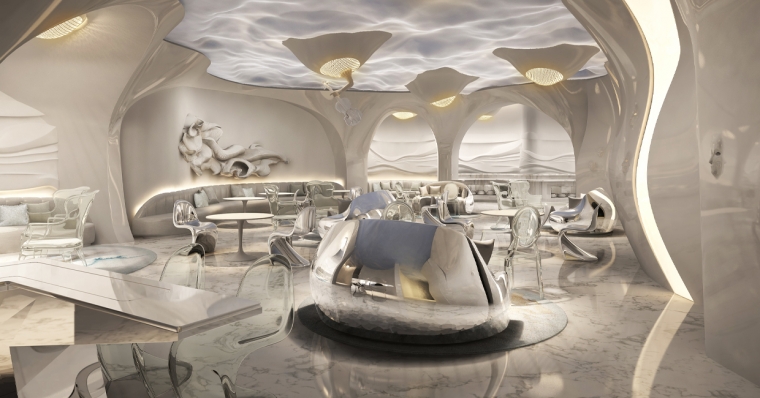
Do you think there is a difference in tone and texture between ideas of hospitality in the Middle East and Europe?
Most definitely! There is a vast distinction between these regions when considering textures and tone/colour. Consider the initial obvious climatic differences, where Europe has seasons and a cold-to-temperate climate. We see tone follow seasonality, with sub-regions such as the Mediterranean’s brightness of light hitting azure ocean or stone of building, versus the subtlety of the soft light inspiration of Nordic and Northern European sub-regions, which have a softer tonal palette, often contrasting against blacks and contrasting elements. We see the softness mirroring the misty light often seen in the North. Textures are refined, often delicate, but equally juxtaposed with variation and technological influences. European textures take cues from cultural influences of sub-region and country, and can be strongly seasonal and trend-seeking.
The Middle East exists under different constructs – never-ending hot sun, bright light, desert tones as far as the eye can see, with punctuations of tonal variety to some elements of interiors. There has always been a love affair with tonal and colour variety in some materials – rugs, fabrics, cushions, etc, plus interior architecture (decorated doors, walls, antiquities, etc). We appreciate that often the use of scarce raw material dictates tonal variation in this region, and a culture founded on trade has seen the implementation of beautiful variations in tone and texture as an announcement of status. The use of hand in artisanal craft inspires a style of texture with a beauty of rawness. Textures of the Middle East speak more of permanence, culture and process than of trend.
Can you tell us about anything exciting you’re working on?
In the Kingdom of Saudi Arabia there is At-Turaif, the birthplace of the House of Saud in Riyadh. This site is UNESCO World Heritage-listed. Wells International has the privilege to be designing the experience centre as part of the larger development. This is moving fast, and our sizeable team are creating something quite special for this discerning client. Our team is very excited by this project.
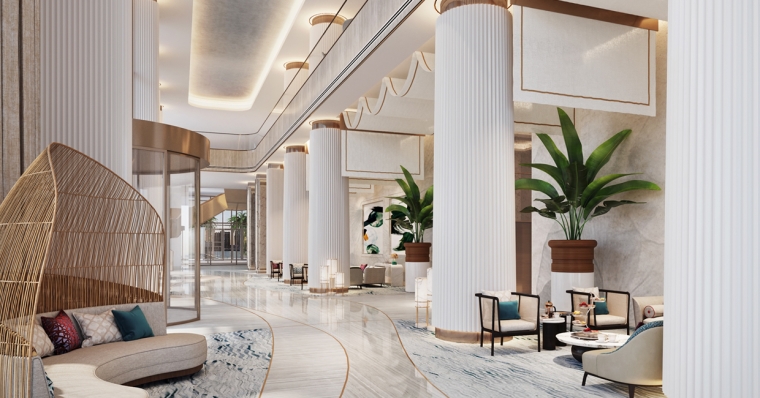
What’s next for you and Wells International?
Taking a breath and enjoying the fresh air. The world of hospitality has changed, and it’s not all bad. I am enjoying the relationships I have with clients and operators in Europe, Middle East and South East Asia. I am fortunate to have such a network, and I have been humbled by the unbelievably positive sentiment received regarding the creation of Wells International.
Q4 and Q1/2021 is a busy time, but Wells International is looking forward to kicking off a few projects in Eastern Europe and Thailand shortly. Our focus is to consolidate our regions of design influence and deliver on these projects. London is a focus, as with the Indian Ocean. Much investment in these regions comes from the Middle East.
What would be your dream hotel project?
Is it even possible to consider just one project as a dream hotel project? Perhaps a palace conversion in an historic building in France, a fort conversion in a remote destination in Asia, a luxury resort on an island location in French Polynesia, or a conversion of a warehouse in New York to create a new luxury urban brand hotel? They’d all be a nice start for 2021 –
Tell us something surprising about Justin Wells that people may not know?
I’m a dreamer, emotionally connected, and an entertainer of sorts. Therefore, I would be best summarised as an ‘imaginist’.


